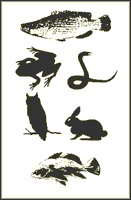Nebraska Cooperative Fish and Wildlife Research Unit

Nebraska Cooperative Fish and Wildlife Research Unit: Staff Publications
Date of this Version
2012
Citation
Angeler, D.G., Pope, K. L. and C. R. Allen. 2012. Saliendo del circulo vicioso: Gestiones alternativas para garantizar la sostenibilidad de la pesca. Revista Latinoamericana de Recursos Naturales 8:76-89.
Abstract
The management of fisheries has historically focused on maintaining maximum sustained yields of single species. This approach generally ignored the broader social-ecological context that consists of coupled systems of people and nature, and resulted in the overexploitation of many fisheries globally, including many in Latin America. There are severe negative repercussion of overfishing, on both ecosystems and humans that rely on food and income provided by fisheries. Traditional management schemes based on maximizing should be replaced with approaches that explicitly recognize the coupling of social and ecological systems. We suggest a resilience approach that focuses on tradeoffs as a means of guaranteeing outputs over a broad range of conditions and avoiding undesirable thresholds. Resilience approaches may on average produce lower annual yields, but are more likely to allow the continued provision of multiple goods and services. A resilience approach requires scientifically derived data and consistent monitoring, and will not be successful if feedbacks between ecosystems and humans are ignored. The words "Fisheries" and "Sustainability" do not comprise an oxymoron but a logical partnership in resilience management. People and institutions engaged in Latin-American fisheries management have an opportunity to lead in the development of sustainable fisheries management with a resilience-based approach. Here we describe such an approach, and the steps necessary to ensure success.


Comments
US government work.